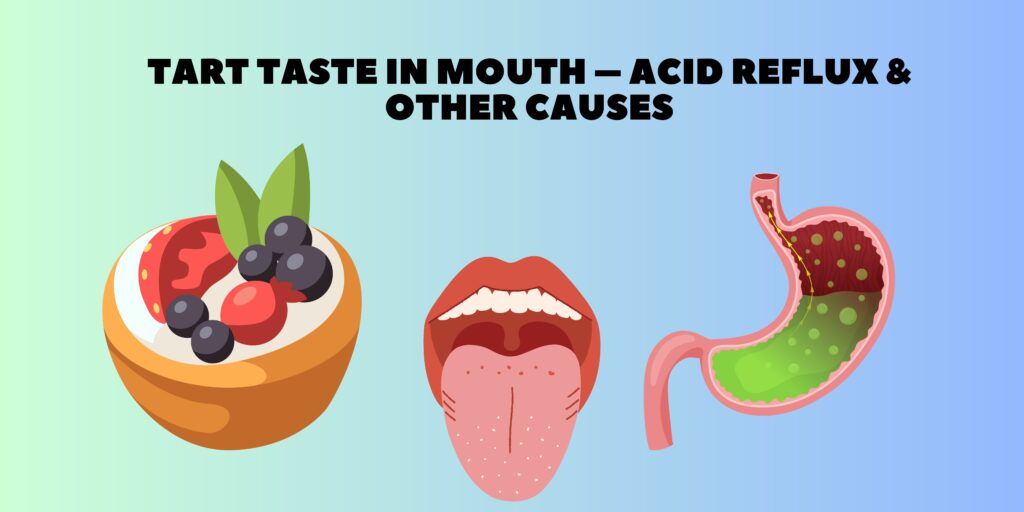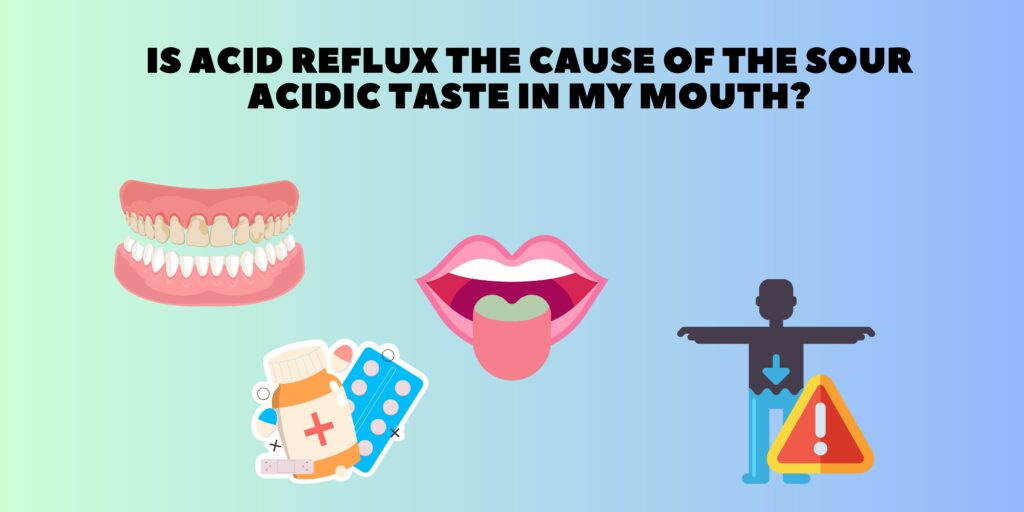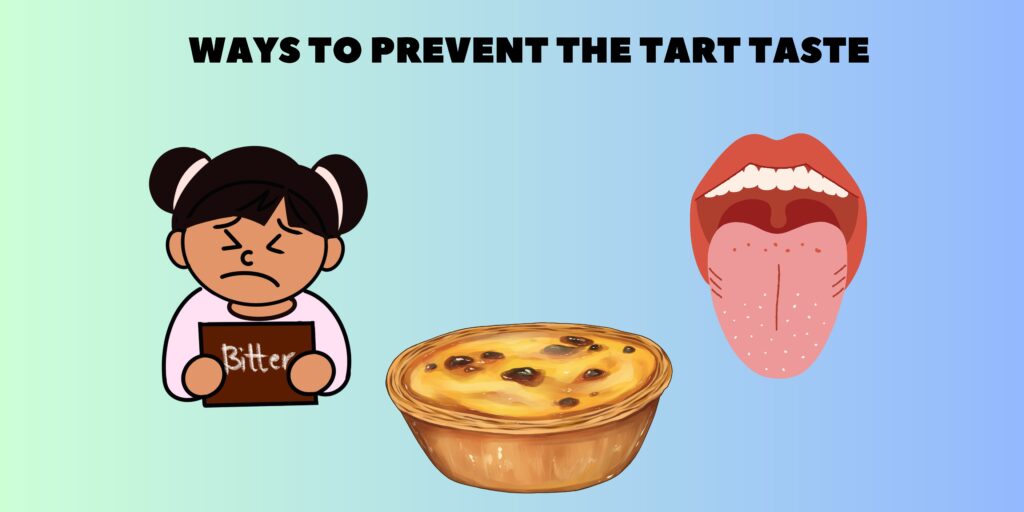
If you have ever experienced a tart taste in your mouth, you know how unpleasant it can be. This taste is often associated with acid reflux, but there are other causes as well. In this article, we will discuss the causes of a tart taste in the mouth and how to treat it.
Causes of a Tart Taste in the Mouth:
- Acid Reflux: Acid reflux occurs when stomach acid flows back into the esophagus, causing a burning sensation in the chest and a sour or tart taste in the mouth.
- Medications: Certain medications can cause a tart taste in the mouth as a side effect. These include antibiotics, blood pressure medications, and antidepressants.
- Oral Health: Poor oral hygiene or gum disease can cause a tart taste in the mouth. Bacteria build-up in the mouth can produce an unpleasant taste.
- Dehydration: Dehydration can cause a dry mouth and a tart taste. When you don’t drink enough water, the saliva in your mouth decreases, and bacteria can grow, causing an unpleasant taste.
Treating a Tart Taste in the Mouth:
- Change Your Diet: Acidic and spicy foods can exacerbate acid reflux and cause a tart taste in the mouth. Avoiding these foods and eating a healthy, balanced diet can help alleviate the symptoms.
- Improve Oral Hygiene: Brushing and flossing regularly can help remove bacteria from the mouth and reduce the tart taste. Using mouthwash can also help kill bacteria and freshen the breath.
- Drink Plenty of Water: Staying hydrated is essential for good oral health. Drinking plenty of water can help keep the mouth moist and prevent a tart taste from developing.
- Medications: If your tart taste is caused by medication, talk to your doctor about switching to a different medication or adjusting the dosage.
In conclusion, a tart taste in the mouth can be caused by several factors, including acid reflux, medications, poor oral hygiene, and dehydration. By following the tips mentioned above, you can alleviate the symptoms and prevent a tart taste from developing. If the symptoms persist, it’s best to consult a healthcare professional to determine the underlying cause and receive proper treatment.
Is acid reflux the cause of the sour acidic taste in my mouth?

If you’re experiencing a sour or acidic taste in your mouth, you may be wondering if acid reflux is the cause. While acid reflux is a common cause of a tart taste in the mouth, there are other potential factors as well. In this article, we will explore the relationship between acid reflux and a tart taste in the mouth.
What is Acid Reflux?
Acid reflux occurs when stomach acid flows back into the esophagus, causing a burning sensation in the chest and throat. It can also cause a sour or tart taste in the mouth, as the stomach acid travels up the esophagus and into the mouth.
Symptoms of Acid Reflux
In addition to a tart taste in the mouth, other symptoms of acid reflux include:
- Burning sensation in the chest and throat
- Regurgitation of food or liquid
- Difficulty swallowing
- Chest pain
- Nausea
How Does Acid Reflux Cause a Tart Taste in the Mouth?
As mentioned earlier, when stomach acid flows back into the esophagus and mouth, it can cause a sour or tart taste. The acid irritates the lining of the esophagus and mouth, leading to the unpleasant taste. In addition, acid reflux can cause a dry mouth, which can also contribute to a tart taste.
Other Potential Causes of a Tart Taste in the Mouth
While acid reflux is a common cause of a tart taste in the mouth, there are other potential factors as well. These include:
- Poor oral hygiene or gum disease
- Medications
- Dehydration
- Infections or illnesses
Treatment for a Tart Taste in the Mouth
If you’re experiencing a tart taste in your mouth, it’s important to determine the underlying cause. If acid reflux is the culprit, making lifestyle changes such as avoiding trigger foods and losing weight can help alleviate symptoms. Medications such as antacids or proton pump inhibitors may also be prescribed. If the tart taste is due to other factors, treatment will depend on the specific cause.
In conclusion, while acid reflux is a common cause of a tart taste in the mouth, it’s important to consider other potential factors as well. If you’re experiencing persistent symptoms, it’s best to consult with a healthcare professional to determine the underlying cause and receive proper treatment.
Other causes for tart taste
While acid reflux is a common cause of a tart taste in the mouth, there are several other potential factors that can contribute to this unpleasant sensation. In this article, we will explore some of the other causes of a tart taste in the mouth.
Poor Oral Hygiene
Poor oral hygiene can lead to a buildup of bacteria in the mouth, causing a tart taste. Brushing and flossing regularly, as well as using mouthwash, can help remove bacteria and reduce the likelihood of developing a tart taste.
Gum Disease
Gum disease, also known as periodontitis, is an infection of the tissues that support the teeth. Along with other symptoms, such as bleeding gums and bad breath, gum disease can also cause a tart taste in the mouth.
Dehydration
Dehydration can cause a dry mouth, which can lead to a buildup of bacteria and a tart taste. Drinking plenty of water and staying hydrated can help reduce the likelihood of experiencing a tart taste.
Medications
Certain medications can cause a tart taste in the mouth as a side effect. Antibiotics, blood pressure medications, and antidepressants are just a few examples. If you’re experiencing a tart taste while taking medication, it’s important to talk to your healthcare provider about potential solutions.
Infections or Illnesses
Infections or illnesses, such as sinus infections or colds, can cause mucus to build up in the mouth and throat, leading to a tart taste. Treating the underlying infection or illness can help alleviate the symptoms.
Treatments for a Tart Taste in the Mouth
Treatment for a tart taste in the mouth will depend on the underlying cause. If poor oral hygiene or gum disease is the issue, practicing good dental hygiene and seeing a dentist regularly can help. Drinking plenty of water can help if dehydration is the cause. If the tart taste is due to medication, talking to a healthcare provider about adjusting the dosage or switching to a different medication may help.
In conclusion, while acid reflux is a common cause of a tart taste in the mouth, there are several other potential factors as well. By identifying the underlying cause and seeking appropriate treatment, it’s possible to alleviate the unpleasant sensation of a tart taste and improve overall oral health.
Ways to prevent the tart taste

Experiencing a tart taste in the mouth can be uncomfortable and unpleasant. While there are several potential causes of a tart taste, there are also ways to prevent it from occurring in the first place. In this article, we will explore some effective strategies for preventing a tart taste in the mouth.
Maintain Good Oral Hygiene
One of the most effective ways to prevent a tart taste in the mouth is to maintain good oral hygiene. This includes brushing and flossing regularly, using mouthwash, and seeing a dentist for regular cleanings and checkups. By keeping the mouth clean and healthy, the likelihood of developing a tart taste is reduced.
Avoid Trigger Foods
Certain foods and beverages can contribute to a tart taste in the mouth. Acidic foods, such as citrus fruits and tomatoes, as well as spicy and fried foods, can all trigger acid reflux and lead to a tart taste. Avoiding these trigger foods can help prevent the onset of a tart taste.
Stay Hydrated
Dehydration can lead to a dry mouth, which can contribute to a buildup of bacteria and a tart taste. Drinking plenty of water throughout the day can help keep the mouth hydrated and reduce the likelihood of a tart taste.
Manage Stress
Stress and anxiety can also contribute to a tart taste in the mouth. Finding ways to manage stress, such as through exercise, meditation, or therapy, can help reduce the likelihood of developing a tart taste.
Quit Smoking
Smoking can lead to a dry mouth and a buildup of bacteria, both of which can contribute to a tart taste. Quitting smoking can not only improve overall oral health, but also prevent a tart taste from developing.
Incorporate Probiotics
Probiotics, which are beneficial bacteria that live in the gut, can help regulate digestion and reduce the likelihood of acid reflux and a tart taste in the mouth. Incorporating probiotics into the diet, such as through fermented foods or supplements, can be a helpful preventative measure.
In conclusion, there are several effective strategies for preventing a tart taste in the mouth. By maintaining good oral hygiene, avoiding trigger foods, staying hydrated, managing stress, quitting smoking, and incorporating probiotics, it’s possible to reduce the likelihood of developing a tart taste and improve overall oral health. If you’re experiencing persistent symptoms, it’s important to consult with a healthcare professional to determine the underlying cause and receive proper treatment.
FAQs
Experiencing a tart taste in the mouth can be concerning and uncomfortable. In this article, we’ve explored some of the potential causes of a tart taste, as well as ways to prevent and treat it. Here are some frequently asked questions about tart taste in the mouth.
Q: Can a tart taste in the mouth be a sign of something serious? A: While a tart taste in the mouth can be a symptom of a serious condition, such as acid reflux or gum disease, it can also be caused by less concerning factors, such as poor oral hygiene or dehydration. If you’re experiencing persistent symptoms, it’s important to consult with a healthcare professional to determine the underlying cause and receive proper treatment.
Q: Can medications cause a tart taste in the mouth? A: Yes, certain medications can cause a tart taste in the mouth as a side effect. Antibiotics, blood pressure medications, and antidepressants are just a few examples. If you’re experiencing a tart taste while taking medication, it’s important to talk to your healthcare provider about potential solutions.
Q: How can I prevent a tart taste in the mouth? A: Maintaining good oral hygiene, avoiding trigger foods, staying hydrated, managing stress, quitting smoking, and incorporating probiotics can all be effective ways to prevent a tart taste in the mouth. If you’re experiencing persistent symptoms, it’s important to consult with a healthcare professional to determine the underlying cause and receive proper treatment.
Q: Can a tart taste in the mouth be a sign of an infection? A: Yes, a tart taste in the mouth can be a symptom of an infection, such as a sinus infection or cold. Treating the underlying infection or illness can help alleviate the symptoms.
Q: How is a tart taste in the mouth treated? A: Treatment for a tart taste in the mouth will depend on the underlying cause. If poor oral hygiene or gum disease is the issue, practicing good dental hygiene and seeing a dentist regularly can help. Drinking plenty of water can help if dehydration is the cause. If the tart taste is due to medication, talking to a healthcare provider about adjusting the dosage or switching to a different medication may help.
In conclusion, a tart taste in the mouth can be caused by a variety of factors, and effective treatment will depend on identifying the underlying cause. By practicing good oral hygiene, avoiding trigger foods, staying hydrated, managing stress, quitting smoking, and incorporating probiotics, it’s possible to prevent and reduce the likelihood of experiencing a tart taste. If you’re experiencing persistent symptoms, it’s important to consult with a healthcare professional to determine the underlying cause and receive proper treatment.
To summarize
A tart taste in the mouth can be caused by various factors, ranging from acid reflux to poor oral hygiene. In this article, we’ve explored some of the potential causes, ways to prevent it, and common questions surrounding this issue. Here is a summary of the key points:
Causes:
- Acid reflux: when stomach acid flows back into the esophagus, it can cause a tart taste in the mouth.
- Poor oral hygiene: not brushing or flossing regularly can lead to a buildup of bacteria and a tart taste.
- Dehydration: not drinking enough water can cause dry mouth and a tart taste.
- Medications: certain medications can cause a tart taste as a side effect.
- Gum disease: an infection in the gums can cause a sour taste in the mouth.
- Other factors: stress, smoking, and certain foods can also contribute to a tart taste.
Prevention:
- Maintain good oral hygiene: brush and floss regularly, and see a dentist for regular cleanings.
- Avoid trigger foods: acidic or spicy foods can exacerbate a tart taste.
- Stay hydrated: drink plenty of water to avoid dry mouth.
- Manage stress: stress can cause a variety of health issues, including a tart taste in the mouth.
- Quit smoking: smoking can contribute to a variety of oral health issues, including a tart taste.
- Incorporate probiotics: consuming foods or supplements with probiotics can promote healthy gut bacteria and reduce tart taste.
Treatment:
- Treatment will depend on the underlying cause of the tart taste.
- Practicing good oral hygiene, drinking plenty of water, and avoiding trigger foods can help alleviate symptoms.
- Consulting with a healthcare professional about adjusting medication dosage or switching to a different medication may also be helpful.
- In more serious cases, such as with acid reflux or gum disease, medication or surgery may be necessary.
Overall, experiencing a tart taste in the mouth can be uncomfortable and concerning, but with proper prevention and treatment, it can be effectively managed. By practicing good oral hygiene, staying hydrated, avoiding trigger foods, and consulting with a healthcare professional, it’s possible to identify and address the underlying cause of a tart taste.